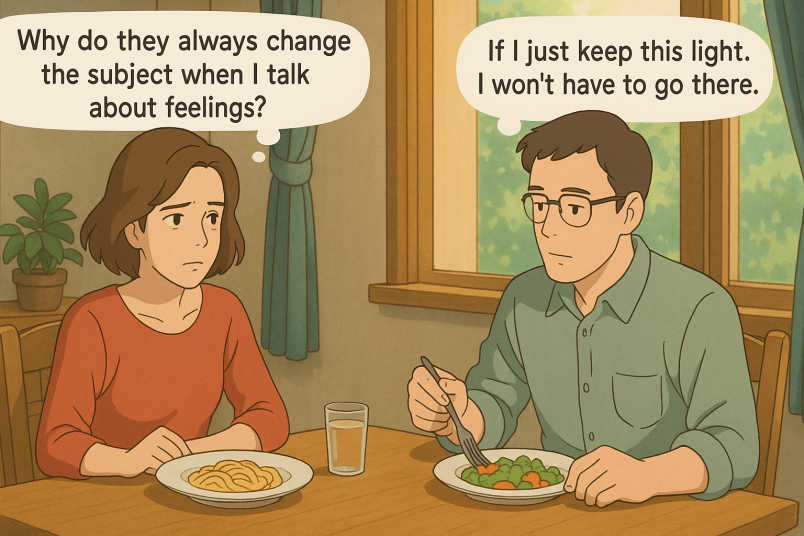13 Subtle Signs of Intimacy Avoidance in a Relationship

Heal & Grow Daily for a Happier Relationship
Subscribe FREEKey Takeaways
Marriage.com AI Quick Summary
Not everyone pulls away in obvious ways. Sometimes, it’s the quiet shift—the way someone changes the subject when things get emotional, or how they suddenly need space right when you’re feeling close.
You might sense it in their eyes, the pause before a hug, or a joke that lands just a little too hard. They may not even realize they’re doing it. Intimacy avoidance can be subtle like that… wrapped in routines, busy schedules, or the comforting mask of “I’m just independent.”
But underneath it all, something feels missing. A closeness you can’t quite reach, no matter how patient, loving, or open you try to be.
You start to wonder, “Is it me?”
But maybe—it’s something deeper. Something unspoken. Something worth understanding.
What is intimacy avoidance in a relationship?
Intimacy avoidance refers to a pattern of behavior where an individual actively avoids or distances themselves from emotional closeness and vulnerability in relationships. People who struggle with intimacy avoidance may have difficulty opening up, expressing their emotions, or allowing others to get close to them on an emotional level.
Research explored how attachment styles relate to different types of intimacy across dating, cohabiting, and married individuals. Findings showed secure attachment linked to all intimacy types, while ambivalent and avoidant styles negatively impacted emotional and social intimacy. Gender differences appeared in avoidant attachment and intellectual intimacy.
This avoidance isn’t always obvious—it can show up as dodging serious conversations, keeping things light, or pulling away when closeness starts to build. Often, it’s rooted in fear: of rejection, of losing control, or of getting hurt. Over time, it creates a quiet distance where connection is needed most.
13 subtle signs of intimacy avoidance in a relationship
Closeness can feel beautiful, but for some, it can also feel unsafe. Intimacy avoidance doesn’t always shout; sometimes, it hides in everyday moments, quiet reactions, or patterns that are easy to miss.
Here are 13 subtle signs that may point to something deeper.
1. Difficulty in expressing emotions
Intimacy-avoidant individuals may struggle to articulate their emotions and share their feelings openly with their partner. This difficulty in emotional expression can create barriers to deep emotional connection and hinder effective communication in the relationship.
Avoiding intimacy can lead to a sense of emotional disconnection and hinder the development of a deep and meaningful relationship.
So, why does it happen?
Expressing emotions might have been unsafe or discouraged in childhood or previous relationships. Some were taught to suppress vulnerability or equate it with weakness.
- Partner: “You seem upset—can we talk about it?”
- Avoidant: “I’m just tired. There’s really nothing to talk about.”
Their silence isn’t indifference—it’s self-protection. Opening up feels like stepping into unknown territory where they don’t know the rules or outcome.
2. Superficial conversations
Individuals with intimacy avoidance tend to engage in surface-level conversations, avoiding topics that require emotional vulnerability. By avoiding intimacy in relationships and deeper and more personal discussions, they maintain a sense of emotional distance and avoid exposing their true selves to their partner.
Emotional avoidance in relationships can create barriers to open communication, trust-building, and the overall growth of the partnership.
So, why does it happen?
Deeper conversations expose fears, values, and raw parts of the self, which can feel terrifying for someone who associates vulnerability with pain.
- Partner: “What was your childhood like?”
- Avoidant: “Eh, it was normal. Nothing to say, really. Did you see the game last night?”
They redirect the conversation to avoid revealing anything that might trigger emotional discomfort or make them feel seen too clearly.
3. Avoidance of physical affection
Intimacy-avoidant individuals often shy away from physical displays of affection, such as hugging, cuddling, or holding hands. They may feel uncomfortable with the level of emotional closeness that physical affection entails, further contributing to the emotional distance in the relationship.
A 15-year longitudinal study found that romantic patterns from ages 16–24 influenced romantic involvement, turnover, and relationship characteristics at age 30. Early patterns were linked to avoidance of intimacy, jealousy, satisfaction, relationship status, and duration, highlighting how adolescent experiences shape adult romantic development and relationship outcomes.
This withdrawal isn’t always obvious—they might brush it off as “not being touchy” or say they’re just tired. However, over time, their partner may feel unwanted or emotionally disconnected.
So, why does it happen?
They may have grown up in environments where physical affection was rare, shamed, or conditional. As a result, touch now triggers discomfort or even panic. For example:
- Partner: “Can we just cuddle a bit?”
- Avoidant: “I’m not in the mood—can we not make a big deal out of it?”
Even gentle physical touch can feel like pressure to be emotionally vulnerable, which they’ve learned to avoid.
4. Fear of commitment
Those with intimacy avoidance may exhibit a fear of committing to long-term relationship goals or making future plans. Commitment requires a deeper level of emotional investment, which can be challenging for intimacy-avoidant individuals who fear the potential emotional risks and vulnerability that come with it.
They may hesitate to define the relationship, delay moving in together, or avoid discussing “what’s next.” This uncertainty can leave their partner feeling insecure or emotionally stuck.
So, why does it happen?
They often equate commitment with entrapment or inevitable heartbreak. Maybe they’ve seen relationships fail or were hurt badly before. When asked,
- Partner: “Where do you see us a year from now?”
- Avoidant: “I don’t know—I don’t like thinking that far ahead.”
It’s not a lack of love; it’s fear of getting in too deep and losing control or getting hurt.
5. Discomfort during moments of emotional intimacy
Intimacy-avoidant individuals may experience unease or discomfort when faced with situations that require emotional intimacy. They may resort to emotional withdrawal or distancing themselves as a coping mechanism to protect themselves from potential emotional harm.
Even heartfelt compliments or deep conversations can feel overwhelming. Instead of leaning in, they might go quiet, change the subject, or physically leave the room.
So, why does it happen?
They often weren’t taught how to handle emotional closeness—maybe they were told to “toughen up” or ignored when they expressed feelings.
- Partner: “I really appreciate you; it means a lot having you in my life.”
- Avoidant: [laughs nervously] “Okay, wow, that’s a lot… thanks?”
The intimacy feels foreign and emotionally unsafe, triggering a need to retreat or deflect.
6. Sabotaging relationships
Unconsciously sabotaging relationships is a common pattern among those with intimacy avoidance. As a relationship deepens, they may create barriers or find reasons to end or distance themselves, subconsciously avoiding intimacy in relationships, the emotional vulnerability, and the potential risks that come with a closer connection.
This can look like picking fights, pulling away right after a romantic moment, or suddenly questioning the relationship. Often, it leaves their partner confused and hurt without understanding why.
So, why does it happen?
They may fear that the closer they get, the more there is to lose. So they create distance first, before the other person can hurt them.
- Partner: “Things have been going so well lately.”
- Avoidant: “Yeah… maybe too well. I’m just not sure this is what I want.”
It’s an unconscious defense—leave before you’re left, hurt before you’re hurt.
7. Trust issues
Intimacy-avoidant individuals often struggle with trusting their partner’s intentions. They may frequently question their motives, leading to difficulties in building a strong foundation of trust in the relationship. This lack of trust can further contribute to emotional distance and hinder intimacy.
Avoidant intimacy can hinder the development of deep emotional connections and the growth of a fulfilling relationship.
So, why does it happen?
Trust issues often stem from betrayal, abandonment, or inconsistency in early or past relationships. If trust once led to pain, skepticism becomes a shield.
- Partner: “Why don’t you believe me when I say I care about you?”
- Avoidant: “Because people say that… and then leave.”
They don’t mistrust because of something their partner did; they mistrust because past wounds are still echoing through the present.
8. Prioritizing personal space and independence
Those with intimacy avoidance tend to prioritize personal space and independence over shared activities. They seek autonomy and maintain emotional distance within the relationship, creating a barrier to developing a deeper emotional connection.
While independence is healthy, this extreme need for space can feel like avoidance. It may seem like they’re more committed to their routine than to building closeness with their partner.
So, why does it happen?
They often associate closeness with losing their identity or freedom. If they’ve been in controlling environments or codependent dynamics before, independence becomes a form of safety.
- Partner: “Why don’t we do something together this weekend?”
- Avoidant: “I’ve already planned a solo hike—I need time to clear my head.”
They’re not trying to push their partner away; they’re trying to protect the boundaries that make them feel safe.
9. Fear of rejection and abandonment
Deep-seated fears of being judged, rejected, or abandoned by their partner often plague intimacy-avoidant individuals. They keep their guard up and avoid emotional vulnerability as a means of protecting themselves from potential emotional pain.
Ironically, in trying to avoid getting hurt, they may create the very disconnection they fear. Their partner might feel shut out or wonder if they’ve done something wrong.
So, why does it happen?
Past emotional wounds—like being betrayed, dismissed, or abandoned—make emotional exposure feel dangerous. Vulnerability is seen as a setup for loss.
- Partner: “You can tell me how you feel. I’m not going anywhere.”
- Avoidant: “It’s fine. I just don’t like talking about stuff like that.”
They may believe that if they reveal too much, they’ll be rejected, so they stay silent to stay safe.
10. Avoidance of conflict resolution
Intimacy-avoidant individuals may shy away from addressing relationship issues or engaging in conflict resolution. They fear that such discussions may lead to emotional exposure or even the breakdown of the relationship, further perpetuating emotional distance and hindering the growth of intimacy.
They might minimize problems, change the topic, or say, “It’s not a big deal.” Unfortunately, this silence can cause resentment to build and deepen the emotional gap.
So, why does it happen?
Conflict feels like a minefield where every word could spark abandonment, shame, or escalation. They may have grown up with explosive arguments or were never taught how to repair emotional ruptures.
- Partner: “Can we talk about what happened last night?”
- Avoidant: “I’d rather just forget about it—it’s not worth fighting over.”
Their silence isn’t peace—it’s fear in disguise, meant to avoid emotional vulnerability or perceived danger.
11. Over-focusing on work or hobbies
People with intimacy avoidance may throw themselves into work, hobbies, or routines as a way to sidestep emotional closeness. Staying busy gives them a convenient excuse to avoid vulnerable moments or deeper conversations.
Their partner might feel like they’re always second to a project, task, or schedule. Over time, this pattern creates distance, not just physically, but emotionally, too.
So, why does it happen?
Busyness offers a distraction from uncomfortable emotions and shields them from the risks of closeness. When asked,
- Partner: “Why are you always working late?”
- Avoidant: “I just have a lot going on—it’s nothing personal.”
Being busy feels safer than being emotionally available, especially when vulnerability feels unfamiliar or overwhelming.
12. Using humor or sarcasm to deflect serious moments
Rather than leaning into emotional conversations, intimacy-avoidant individuals may joke, tease, or use sarcasm to avoid getting too serious.
Laughter becomes a shield, even when their partner is trying to express something heartfelt. This can leave the other person feeling dismissed or unheard. Over time, humor stops feeling playful—it starts feeling like avoidance.
So, why does it happen?
Serious conversations often stir up discomfort. Humor helps them maintain control and avoid deeper feelings.
- Partner: “I feel like you never open up to me.”
- Avoidant: “Oh, come on—I’m emotionally mysterious, isn’t that why you love me?”
What seems like a joke is often a defense against feeling exposed or vulnerable.
13. Sudden withdrawal after moments of closeness
An intimacy-avoidant partner might seem fully present—laughing, connecting, even sharing deeply—only to withdraw soon after. They may become distant, busy, or irritable out of nowhere.
This push-pull behavior often confuses their partner and creates emotional whiplash. What felt warm one moment can quickly turn cold the next.
So, why does it happen?
Closeness can trigger old fears of being hurt or losing independence. The withdrawal is a reflex to regain control.
- Partner: “We were having such a good night… what happened?”
- Avoidant: “I don’t know—I just need some space, okay?”
After the connection, they instinctively pull back to protect themselves from the vulnerability that lingers.
Can a relationship survive intimacy avoidance?
A relationship can survive—sometimes even grow stronger—when intimacy avoidance is understood with patience and care. But it isn’t always easy. An intimacy-avoidant partner might not realize how their distance slowly wears down connection… trust… even desire.
Over time, their silence, withdrawal, or hesitation can leave the other person feeling unwanted or confused. Emotional closeness begins to feel out of reach. Yet with honest conversations, small steps forward, and compassion on both sides, it’s possible to rebuild what feels lost—bit by bit, heart by heart.
Intimacy avoidance can significantly impact relationships in several ways:
- They may struggle with expressing emotions or discussing personal matters, leading to a lack of depth and emotional connection in the relationship.
- They may keep conversations superficial, avoiding intimacy in relationships and deeper discussions that require emotional vulnerability.
- They may avoid hugging or holding hands, creating a sense of emotional distance between partners.
Overall, intimacy avoidance can result in a lack of emotional intimacy, trust issues, communication challenges, and relationship dissatisfaction.
How to gently rebuild intimacy: 5 tips
Rebuilding intimacy doesn’t have to be rushed or dramatic. In fact, it often works best when it’s slow, steady, and rooted in small, everyday moments.
If someone struggles with emotional closeness, patience and kindness go a long way. Here’s how to start creating safer, softer spaces for connection again.
1. Start with a safe, light vulnerability
You don’t have to dive into deep secrets right away. Begin with small moments of openness—sharing a sweet memory, admitting a fear of something silly, or even just saying, “I missed you today.”
This shows you’re safe with your feelings and invites your partner to try the same. Over time, this builds trust and softens the emotional walls.
- Mistakes to avoid: Don’t overwhelm them with heavy confessions or expect instant change. Avoid phrases like “You should tell me everything by now!”—it adds pressure, not comfort.
2. Make physical affection gentle and optional
Physical closeness doesn’t have to mean big, romantic gestures.
A soft touch on the arm, a casual hug before leaving the house, or sitting closer on the couch—these little things remind your partner that affection can feel safe and easy. Let them guide the pace. Let them opt in.
- Mistakes to avoid: Don’t demand affection or say things like, “You never hold my hand anymore!” It can make physical closeness feel like a chore, not a choice.
3. Practice patience with emotional conversations
When conversations get emotional, allow pauses, silences… even awkwardness. It’s okay. Not everyone processes feelings the same way or at the same speed.
Instead of pushing for answers, you can say, “Take your time, I’m here when you’re ready.” That’s how emotional safety grows—slowly, patiently.
- Mistakes to avoid: Don’t rush to “fix” things or force them to talk right away. Avoid turning gentle conversations into interrogations or arguments about “why they won’t open up.”
4. Create shared moments without pressure
Connection doesn’t have to come from big talks or deep feelings—it can also grow through quiet, simple things.
Cooking together, evening walks, listening to music… these build familiarity and warmth without forcing anyone to “get vulnerable” right away. Shared moments lead to shared trust.
- Mistakes to avoid: Don’t treat these activities like tests of your closeness. Avoid over-planning or saying things like, “This is supposed to bring us closer, why isn’t it working?!”
Watch this TED Talk in which Douglas Kelley explores six themes for cultivating true, meaningful intimacy:
5. Acknowledge progress, no matter how small
Celebrate the little things: the eye contact held a second longer, the unexpected hug, the small “I love you” said without prompting. Noticing progress helps it grow.
You can say, “That meant a lot to me—thank you for sharing that.” Encouragement keeps the door open.
- Mistakes to avoid: Don’t dismiss small steps as “not enough.” Avoid comparing your relationship to others or past versions of yourselves—it only creates unnecessary pressure.
Healing begins with awareness
Noticing these subtle signs isn’t about blaming yourself or your partner—it’s about understanding what’s really happening beneath the surface. Intimacy avoidance often comes from old wounds, fears, or patterns that were never fully healed. But with patience, empathy, and small, intentional steps, change is possible.
You don’t have to fix everything at once… just recognizing these patterns is already a powerful beginning. Healing takes time, but every honest conversation, every gentle moment of connection, helps build trust where distance used to live. Little by little, closeness can feel safe again.
Want a healthier, happier relationship - one step at a time?
 Tips
Tips
Write your tip or submit a video tip
All tips are reviewed before the publishing.
Share this article on
Recent Articles
Related Quizzes
Heal & Grow Daily for a Happier, Healthier Relationship
Subscribe FREE on YouTube We'd love your feedback!
We'd love your feedback!
 Expert Q&A
Expert Q&A
Ask your question related to this topic & get the support you deserve from experts.


 Reviewed by
Reviewed by
















 Thanks for your feedback!
Thanks for your feedback!